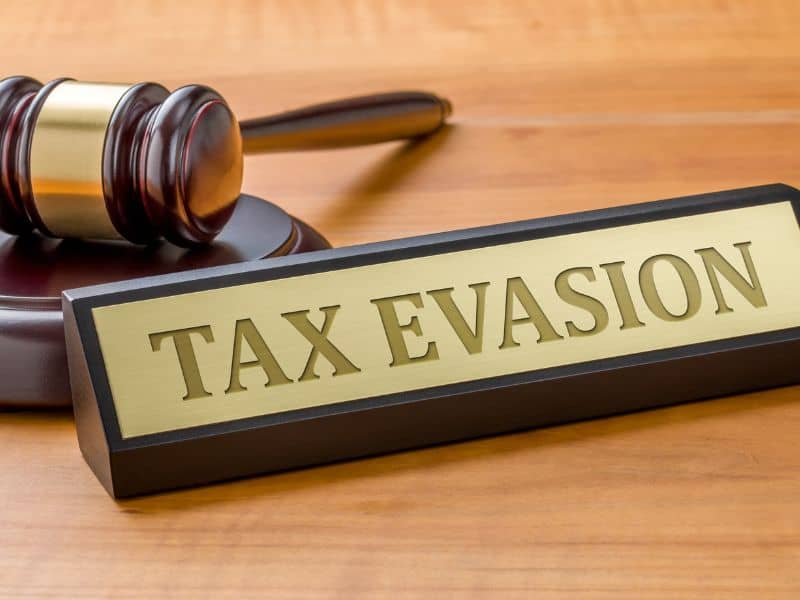Tax evasion is a serious crime that carries criminal charges and penalties. Evading taxes occurs when a person or entity deliberately avoids paying taxes that are owed. In North Carolina, tax evasion is a Class 1 felony with a maximum prison sentence of 15 years.

Title 26 of the United States Code contains most of the provisions of federal law regarding the collection and imposition of taxes. When an individual willfully attempts to evade or defeat a federal tax provided for in Title 26, he/she may be charged with the federal crime of tax evasion in violation of 26 U.S.C. § 7201. In North Carolina, General Statute § 105-236 (7) addresses the “attempt to evade or defeat tax.”
As a taxpayer in North Carolina, it is essential to understand the difference between tax evasion and tax fraud. The two criminal charges have different elements and consequences. Many people use the terms tax fraud and tax evasion interchangeably, but they are distinct crimes.
The difference between tax evasion and tax fraud lies in the intent behind the act. If you are facing tax evasion or tax fraud charges, you need strong, experienced legal representation from Raleigh tax evasion attorneys. Sandman, Finn & Fitzhugh will fight the charges aggressively and pursue appeals if necessary.
Understanding the Differences Between Tax Evasion and Tax Fraud
If you have been charged with either tax evasion or tax fraud, you need to understand what you are charged with, the penalties you are facing, and the elements prosecutors need to prove in order to convict you. Knowing this information can help you make informed decisions about your legal defense strategy with the help of your attorney.
Tax Evasion
Tax evasion occurs when an individual fails to report all of their taxable income or conceals assets or earnings. While tax evasion is not as severe as tax fraud, it still carries significant penalties. The primary distinction between tax evasion and tax fraud is the deliberate nature of the crime.
Tax Fraud
An individual who commits tax fraud intentionally submits false information on a tax return. Common examples of tax fraud include:
- Claiming false deductions or credits.
- Failing to report all income.
- Using false Social Security numbers.
Tax fraud is a criminal offense punishable by imprisonment, fines, and other penalties. In North Carolina, tax fraud is classified as a class H felony with a maximum prison sentence of 25 years.
Intent underlies tax fraud, so prosecutors have to prove a deliberate act of dishonesty to prove that tax fraud occurred. In comparison, for tax evasion to be proven, prosecutors only need to show that a person was negligent. In other words, forgetting to report certain types of income can be enough to convict a person of tax evasion.
Types of Evidence Required
In proving that tax fraud occurred, the government must prove without a doubt that the taxpayer knowingly and intentionally submitted false information on his/her tax return. The prosecution must show that there is a clear pattern of fraud over time.
In tax evasion, the government has to prove that the taxpayer could pay the taxes owed but chose not to do so. This can be difficult for prosecutors to prove and may require using financial records, expert witnesses, and other relevant evidence.
Hire Experienced Legal Representation to Defend Tax Charges
When you are charged with either tax evasion or tax fraud, you are going up against extensive resources with the North Carolina Department of Revenue and the IRS. These entities have the time, money, and personnel to investigate these cases. You may not. This makes it necessary to hire the experienced tax evasion defense attorneys at Sandman, Finn & Fitzhugh who are seasoned in white-collar crime defense strategies, and know how to fight for your rights against these powerful institutions.
N.C. Department of Revenue and the IRS have the legal authority to access your bank records, employment records, and other financial information to build a case against you. Many times, innocent citizens are charged and convicted due to a lack of good representation. In fact, you may have been investigated without realizing it in order for them to start building a case.
Contact Sandman, Finn & Fitzhugh for Tax Charge Defense in NC
If you are charged with tax evasion, you may be facing years of imprisonment, fines, and penalties, changing your life forever. Don’t leave the decision to chance. Contact our knowledgeable tax evasion attorneys to provide the representation you need to fight your case. Contact us 24 hours a day, 7 days a week for a free consultation at (919) 845-6688 or fill out our easy-to-use contact form to consult with one of our experienced attorneys today.
